On 3 October in Assisi Pope Francis will sign his third encyclical “Omnes fratres. On brotherhood and social friendship.” The content of the new encyclical is still unknown, but it is expected to be devoted to the “style” of human co-existence during and after the Coronavirus pandemic. The Vatican says that the Pontiff’s missive will touch on many themes that he discussed throughout the year, one of which is interreligious dialogue.
What form should dialogue between different religious groups take? A declaration of mutual respect is only the beginning of the path. And we will not make any progress unless we jointly discuss the main questions of any religion – the questions of revelation and salvation. Interreligious dialogue is not just about polite diplomatic formulas. It requires a courageous belief in one’s exclusivity (no sincere religious feeling can avoid this) and, at the same time, a recognition of the right of the other to the same belief. It is a work involving constant discernment of how far we are ready to go towards rapprochement, and of where our boundaries lie. This work does not replace the actual effort to achieve closeness, unity, and to complement the other with our own uniqueness. We should understand that the body of humanity is not full without those who are different from us, including those who are in error. However, “artificial unity” only increases division. It is impossible and unnecessary to shift towards unified religious foundations. Rather, we need a moral shift in a form of agreement that takes in differences of belief. We need a clear understanding not of the artificial but of the real unity of human nature, which underlies this difference. The agreement of the different is what allows the higher human faculties to freely unfold in these difficult times of wars, uprisings, political repression and pandemics. To understand the greatness of Islam means to understand that it is higher even than our completely legitimate conviction in its unconditional rightness. The scope of Islam encompasses not just Muslims but the whole of humanity. Everyone is allotted their place in the history of salvation. This means that a genuine interreligious dialogue, no matter how important the declared social doctrines of the religions, requires serious discussion of theological questions as such. What kind of dialogue is it when you look at your interlocutors as inhabitants of hell? Is it just a pragmatically justified move in a political game? One cannot avoid this question by getting tangled up in social ‘red tape’. The answer to it reveals the possibility of a truly shared peaceful quest within a single humanity. The war against malicious suspicion, the war against the splitting of feelings into soppy sentimental acceptance of one’s own and intolerant judgment of others is the source of the fullness of religious attention, concentration on the fundamental, and consequently, of substantive, productive interreligious dialogue.
“If ye reject (Allah), truly Allah hath no need of you; but He liketh not ingratitude from His servants: if ye are grateful, He is pleased with you. No bearer of burdens can bear the burden of another. In the End, to your Lord is your Return, when He will tell you all that ye did (in this life). For He knoweth well all that is in (men’s) hearts.” (Q. 39:7).
Damir Mukhetdinov,
Executive director of the International Muslim forum,
First assistant head of the Religious Board of Muslims of the Russian Federation,
Rector of the Moscow Islamic institute.
